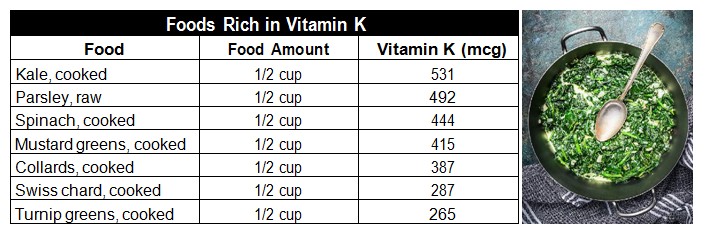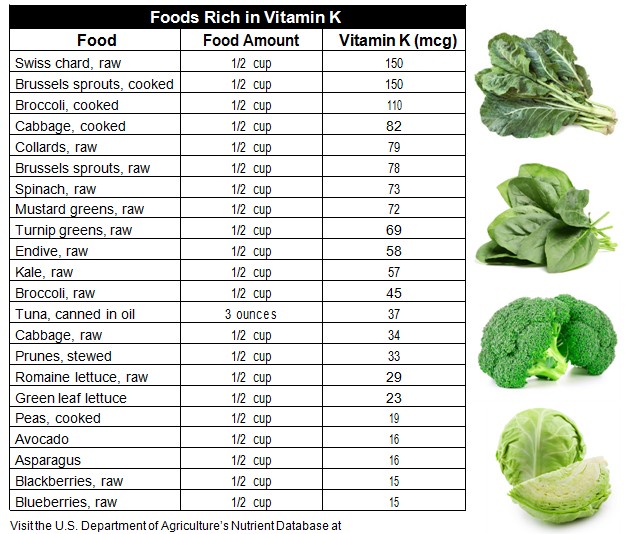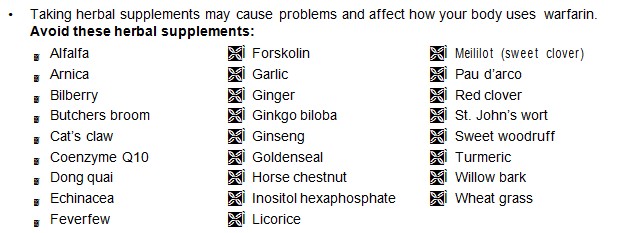Your doctor has prescribed the medicine warfarin (brand names Coumadin and Jantoven) for you. It is an anticoagulant (blood thinner) that makes your blood clot more slowly to prevent dangerous problems, such as a stroke.
Your doctor can tell how well warfarin is working from a blood test, called international normalized ratio (INR). The test shows how quickly your blood clots.
There are some foods, including those rich in vitamin K, alcohol, some dietary and herbal supplements, as well as some medicines, that can affect the way warfarin works in your body.
Foods rich in vitamin K
To help warfarin work well, it is important to keep your vitamin K intake as consistent as possible.
- A large increase in vitamin K can lower your INR to cause dangerous clotting in your blood.
- A large decrease in vitamin K can raise your INR to make it harder for your blood to clot. This could cause you to bleed too much. You do not need to avoid or follow a diet low in vitamin K while taking warfarin.
To keep your INR stable and within your recommended range:
- Take warfarin exactly as your doctor directed.
Have your INR checked regularly. The test is done at least monthly.
Keep your vitamin K intake consistent week to week. For example, you may plan to eat 1/2cup of foods rich in vitamin K per day. If you like to eat these foods and eat them often, you can eat them, but be consistent.
- Do not make any major changes in your intake of foods rich in vitamin K. For example, if you eat a spinach salad every day, do not stop eating it entirely.
- Discuss vitamin supplements with your doctor. Do not take more than 1 supplement that contains vitamin K.


https://ndb.nal.usda.gov/ndb for vitamin K content of common foods.
If you greatly increase or decrease foods rich in Vitamin K in your diet, let your doctor know right away.
If your INR levels are hard to manage, meet with a dietitian to review the vitamin K content of your diet.
Cranberries
Moderate amounts of cranberry products are fine, such as one, 8-ounce glass of cranberry juice a day. Avoid eating or drinking large amounts of cranberries, cranberry juice, and cranberry supplements while taking warfarin.
Grapefruit
Do not eat grapefruit or drink grapefruit juice while taking warfarin.
Alcohol should be avoided. Talk to your doctor if you have questions.
Dietary and herbal supplements

- Use of herbs in cooking, such as garlic and ginger, are safe to eat while you are on warfarin.
- Some vitamin and mineral supplements in large doses can affect your body’s response to warfarin, such as taking more than 800 units of vitamin E a day.
- It is safe to take an adult multivitamin each day that contains vitamin K, but do not take other supplements that contain vitamin K, such as a Viactiv calcium supplement.
- Always talk to your doctor before starting, taking, or changing any herbal supplements, herbal teas, or dietary supplements.
Liquid nutritional supplements
Liquid nutritional drinks like Ensure, Boost, and Glucerna have a low amount of vitamin K added to 8-ounce bottles. If you drink several of these bottles each day, your vitamin K level may increase and require your warfarin dose to be changed.
If you use these nutritional drinks, tell your doctor that you are taking them since it may affect your warfarin dose.
Medicines














